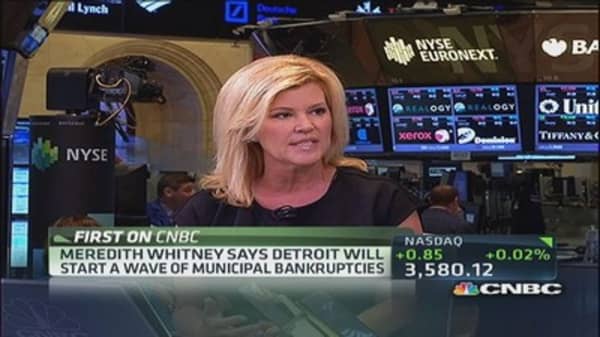The selloff triggered fund redemptions, and the selling has cascaded. Detroit is a relatively new concern in the selloff. Investors have been exiting municipal bond funds, with $2.5 billion of outflows in the last week alone and about $16 billion in the past five weeks, according to ICI data.
"The GO portion of Detroit's debt package is not so high relatively," said Patrick Early, chief municipal analyst at Wells Fargo Advisors. "The reason people are so concerned is there has been an expectation that GO is about as good as it can get, and even in a bankruptcy it ought to take priority over some other liabilities, and what Kevyn Orr is trying to do is treat all the unsecured debt with parity."
One type of bond Orr is targeting is the unlimited-tax GO bond, viewed as the highest order of muni security, as it is voter-approved, properly authorized and has unlimited taxing power, according to Blake Anderson of Mesirow Financial.
"It is the Cadillac of general obligation securities," he said.
(Read more: Detroit not a one-off, aftershocks will be staggering: Whitney)
GO bonds represent a relatively small portion—about $1.1 billion—of Detroit's total $18 billion in debt, Mesirow strategists said. The premium, unlimited-tax GO bonds total just under $500 million. Mesirow makes a market in some Detroit issues and other Michigan bonds. Other GO bonds do not have an unlimited taxing ability.
While the portion of its GO debt is small, Detroit could be making a big statement if its emergency manager gets his way.
"It would cause some havoc and some significant repricing in the market if that were found to be the case," Anderson said.
Because these types of bonds previously have been dealt with as sacrosanct, the market is assessing other GO bonds—particularly those on Michigan municipalities—for similar risk. If upheld, Orr's plan would be precedent-setting and could throw into question the pricing of hundreds of billions of dollars of debt.
As in the case of Detroit, there are municipal GO bonds that have state protection, and those additional security features may get a premium to other GO debt if Orr's plan goes ahead.
(Read more: How your city might pay for Detroit's money mess)
"If in fact it is upheld that they're allowed to dissolve the full faith and credit of general obligation bonds, then that will be priced into the market," said John Donovan, senior vice president at Drexel Hamilton. "I don't ultimately believe that will happen, so I don't think it's affecting the market. If it was affecting the market right now, you would see massive credit-spread widening, and we're not seeing that."
"People are paying attention. They are aware and they are concerned. I don't think it's radiating too far yet," Early at Wells Fargo said of the Detroit issues. "The ripples are there, but they're not killing the market so to speak. … Right now, it's probably more localized to Michigan and with municipal bankruptcy, there are so few settled municipal bankruptcies and the settlement that was adjudicated doesn't necessarily translate to the next municipal bankruptcy. I think the market does understand what's going on in Michigan could stay in Michigan, and right now there is concern about Michigan municipal GO."
About 40 percent of municipal bond market is GO bonds, and a municipality's debt service on such bonds typically is less than 10 percent of its budget, Early said. While it seems a Detroit issue would be contained to Michigan, the market is also concerned about contagion if Orr succeeds, he added.





